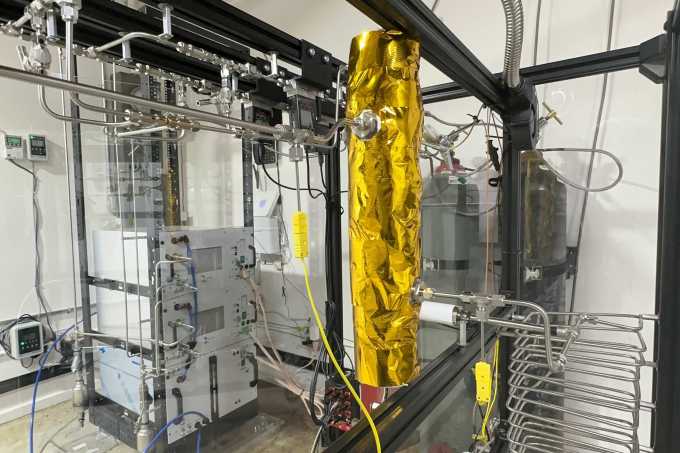Plenty of products benefit from tight integration, where companies design and sometimes build key components of a product in-house: Apple and its custom microprocessors and Tesla and its Superchargers are two notable examples.
It’s not an easy strategy to get right, but General Galactic, a stealthy new startup, hopes the approach will let it drive prices down for so-called e-fuels, which produce hydrocarbons from captured carbon dioxide, the company told TechCrunch exclusively.
The company was born out of co-founder and CEO Halen Mattison’s time at SpaceX. “I was working on a team that was focused on propellant generation for Starship. I started to think, ‘Hey, what are we going to do when we get to Mars? How are we going to produce fuel to come home?’”
Mattison urged SpaceX to tackle the problem, but it was too tangential to the company’s goals at the time, he said. Around that time, he was also leaving SpaceX to attend grad school at Stanford. There, he met Luke Neise, and the two started the company after realizing that producing methane from carbon dioxide would be more useful here on Earth than it would be on Mars.
The two struck out on their own after graduating from Stanford in 2022, and they raised a $1.9 million pre-seed round in July 2023 from venture capital firms including Box Group and Refactor.
“The north star for us is to make methane in a way that is literally cheaper to synthesize from the air, to reuse the emissions, than to pump it out of the ground,” Mattison told TechCrunch.

The plan is to design and develop the entire system in house so the startup can capture carbon dioxide from the air, produce hydrogen from water and combine the two to form methane, all using renewable power. It’s a sharp difference from other companies, which work on just one piece of the puzzle, whether it be direct air capture, electrolysis or e-fuels production.
Techcrunch eventJoin 10k+ tech and VC leaders for growth and connections at Disrupt 2025
Netflix, Box, a16z, ElevenLabs, Wayve, Sequoia Capital, Elad Gil — just some of the 250+ heavy hitters leading 200+ sessions designed to deliver the insights that fuel startup growth and sharpen your edge. Don’t miss the 20th anniversary of TechCrunch, and a chance to learn from the top voices in tech. Grab your ticket before Sept 26 to save up to $668.
Join 10k+ tech and VC leaders for growth and connections at Disrupt 2025
Netflix, Box, a16z, ElevenLabs, Wayve, Sequoia Capital, Elad Gil — just some of the 250+ heavy hitters leading 200+ sessions designed to deliver the insights that fuel startup growth and sharpen your edge. Don’t miss the 20th anniversary of TechCrunch, and a chance to learn from the top voices in tech. Grab your ticket before Sept 26 to save up to $668.
San Francisco | October 27-29, 2025 REGISTER NOWBy integrating the entire stack and selling just the fuel, not the equipment, Mattison said General Galactic will have a greater incentive to drive down costs. “I think one of the mistakes that other companies have made, and other scientists who have looked at this, is siloing themselves,” Mattison said. “Then what’s your goal there? You’re going to make the most money you can off of your electrolyzer, for example. Whereas we want to sell the fuel, so our goal is to minimize those costs.”
General Galactic’s plan is to modularize each key component, an approach that’s becoming standard these days among climate tech startups. Modular components can be mass-produced and are more easily transported long distances. They’re also easier to design and develop in a small lab, and final installation of a commercial-scale plant is less likely to incur significant construction costs.
The startup has been focused on the methane reactor to start, and Mattison said the company is producing about 2,000 liters of methane per day. He said the decision to focus on methane and not sustainable aviation fuel, a common target of many e-fuels startups, was deliberate. Aviation fuel is a small market, he said, while natural gas is used throughout the economy. “We want to be anywhere that people are using methane today,” Mattison said.
It’s a lofty goal, though that shouldn’t be surprising given General Galactic’s similarly ambitious plan to do everything in-house. Each of those components — direct air capture units, electrolyzers and methane reactors — could form the basis of independent businesses. Though each step is based on proven science, each of them comes with a range of engineering challenges, challenges that have tripped up some of their predecessors. That’s not to say General Galactic is tackling an impossible task, just that it has its work cut out for it.

